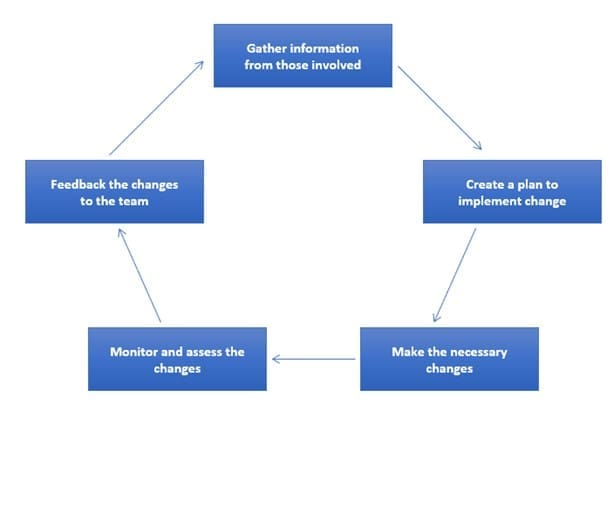In this post
Each person within an organisation must play a role in supporting change. Individuals must work to ensure that the company as a whole continues to expand and grow as times change. People themselves can be incredibly influential during this time and will be able to assist the organisation as changes are implemented.
Ways in which the individual can support change
When changes are implemented within an organisation, the success is usually related directly to the willingness of staff. How they approach the situation can have huge impacts on whether or not the proposed change will work. Individuals who are extremely averse to change and do not wish for things to be altered can become a barrier to change. Barriers make the change process much more complicated and difficult. It is the individual staff members that influence the success of different methods, equipment and ways of doing things within an organisation, so learning how to accept and work with new developments is crucial.
There are many ways in which people can support changes in the workplace including:
- Undergoing more training and developing skills to ensure they are capable of dealing with differences to their everyday routine
- Being open-minded and welcoming to changes that are made
- Always being positive when discussing things with colleagues and having a positive effect on the team which you work with
- Placing your fears and scepticisms to one side and realising that your own mental attitude will usually play a large role in the success of changes
- Embracing the change and looking for the positive things that come from alterations to the work environment
- Being a good role model to younger or less experienced members of staff throughout the entire process
Preparing for change in the workplace
As we have already discussed, change can happen in a variety of different ways. It is important that people are prepared for this. Simply expecting change to be easy and believing that you will be able to cope with any obstacles can be fairly naïve. It is much better to prepare yourself and other staff in advance. This will allow you to consider what may happen and how your working situation could be affected. Some examples of change and the way in which individuals can prepare include:
- People can prepare for a change in equipment or software by doing some research on the type of new systems coming into play. This will help you to work efficiently after the change and adapt to how things are different in a faster time frame
- If you are moving offices or to a new department within the company, there are several things that you can do to support the change. This may be a case of meeting with your new team and getting to know them prior to the change being implemented or getting to know your new surroundings in advance. If you are moving offices, then ensuring that your existing space is tidy and organised will make the moving process a lot smoother
- Should a change require you to begin doing new jobs and take on tasks that you may not be comfortable with, then you can ask to undergo special training in preparation for when things are altered. This will enable you to get to grips with your new tasks as soon as possible and ensure you do not waste too much time learning trivial things and being unproductive
Contributing to change planning
Being able to contribute to the planning for change within the work environment is incredibly important. This means you are able to have an input on how change is implemented. The quality of the plans that are put in place will have a large impact on the success of these changes and how they work. There should be a cycle that helps people to assess what needs to be changed, how to plan, and then how to implement changes in a business environment.

Involving staff
Being able to work with those in your team and implement changes together is very important. The incentives for staff should be clearly explained to all team members when changes are brought into effect. Each person must understand why the changes are being made and how they will benefit their own working lives. Without this, people can be dubious of how the changes will be of benefit to them in their role. Staff will enjoy changes and be much more open to things being altered if they are included in decision-making processes. When staff are against change there will often be a reason such as:
- They have had no prior warning of the changes that are to take place and are unprepared for this
- They believe that the way things are currently done is better
- They are scared or do not want to change their approach to the jobs they carry out

It is important to be able to work with staff to actively promote change. Working with staff to explain the way change will be implemented, will have a massive impact on how staff work in the work environment. Being involved in the change process will bring about help and support from all staff members and enable each person to feel included. Changing things without discussions can cause people to be hostile to change. Involving staff and explaining the reasons for alterations will ensure that they are included and feel part of the process.
Allowing employees a voice is a very valuable strategy in change management. It encourages a feeling of ownership and a positive attitude to the new way of doing things. Any issues which arise later on will be easier to deal with as the changes have already been agreed upon as a team and no one person will be to blame.



